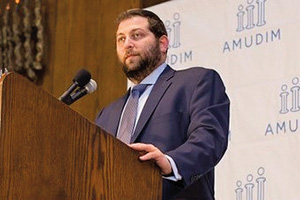
On Sunday, April 22, the Teaneck community and Amudim invite the Greater Bergen County Jewish population to an evening of awareness and education about the growing epidemic of substance abuse and addiction within the community. Amudim, a not-for-profit organization, is a confidential resource center that provides direct support and referrals for individuals and families affected by addiction. Rabbi Zvi Gluck, director of Amudim, and his compassionate staff of expert clinicians, are dedicated to serving the community in times of crisis.
Lianne and Etiel Forman have been members of the Teaneck community for many years. Their eldest daughter, Elana, has been dealing with addiction for some time. In their quest to find ways to deal with the issues this illness causes, and to find support for their entire family, Lianne noticed that no one in the surrounding community ever talked about facing addiction challenges themselves. “We have been dealing with this crisis for a year and a half and throughout that time we have not heard of or met one local family dealing with substance abuse,” said Lianne. The absence of community support caused Lianne and her husband to feel quite alone on their journey to get their daughter the help she needed.
As they struggled to find resources to support themselves and their daughter, Lianne knew there must exist other local families dealing with substance abuse, just not openly discussing it. “Unfortunately, addiction is a subject surrounded by stigmas and misconceptions. One of the best things we can do is to educate ourselves as to what addiction is and gain an understanding of what those struggling with addiction are going through and how we can help,” Lianne articulated. Issues related to drug addiction are too vast to be handled independently. People need a support system that will allow them the opportunity to discover options and learn from others that are battling this disease as well.
At age 19, Rabbi Gluck sustained the loss of two close friends, one to suicide and the other to an accident as a result of using drugs. This prompted him to become involved at a local drop-in center that focused primarily on drug and alcohol abuse, issues not openly addressed back in the ‘80s. As time passed, Rabbi Gluck became more educated and more involved in crisis management. Raised in a family of public service providers, with his father a founding member of Hatzalah, Rabbi Gluck obtained semicha and became a liaison for the police department in New York. This opportunity enabled him to help at-risk teens who were continually getting into trouble with the law.
In 2014, Rabbi Gluck, along with a few colleagues, realized that addiction and abuse were becoming widespread and decided it was time to take their efforts to the next level. They created Amudim, which Rabbi Gluck describes as “the beginning of taking two taboo topics, addiction and abuse, and making them mainstream, at least from the side of an organizational structure, allowing for awareness, education and services.” Within the industry of crisis management, this was truly groundbreaking. Amudim started with three people in a small office working with a budget of less than $400,000. Looking at 2018, Rabbi Gluck estimates the budget to be over $5 million, with offices in three states and two countries, providing comprehensive case management and crisis intervention for those suffering from addiction or abuse. Amudim assists anyone who reaches out to them regardless of one’s background. Primary funding comes through the Jewish community and therefore clients are mainly Jewish, but services are available for anyone in need. Amudim is staffed with highly trained professionals who are all experts in the field. Clinicians are constantly researching new information and treatment options to ensure that the programs they recommend are effective.
The goal of the event is to raise awareness and understanding about substance abuse, and at the same time eliminate the stigma often associated with the disease. Addiction is a form of mental illness and should not be ignored. Within the Orthodox sector, addiction concerns typically remain undisclosed, yet the community is not immune to this disease. Through open dialogue, families can gain the support and encouragement that is so vital in a time of crisis. The effect of addiction can be far reaching, often causing other health concerns as well. According to specialists at Amudim, the more educated one is about the issues surrounding addiction, the more capable they will be at detecting and dealing with substance abuse.
Amudim travels to communities to teach people about the signs of substance abuse and what to do if it is suspected. They also visit high schools where they can communicate directly with kids who are at risk. In many cases, the speakers themselves are recovering addicts. By offering professional assistance in a caring and compassionate manner, Rabbi Gluck believes the outcome can be far greater than the silent alternative. Amudim offers support to the family as a unit, not just the person suffering from addiction. “Making sure there is a set of hands to carry them through the entire process is a fundamental goal at Amudim,” explained Rabbi Gluck.
Lianne and Etiel recognize the importance of confidentiality. They have taken a personal leap in spearheading this event, thereby revealing their family’s struggle with this debilitating disease. Nonetheless, they believe that with community support, both sufferers and their families have a better chance at recovering.
“Those who struggle need support, not only from their loved ones but from the entire community,” Lianne urged.
The evening will include words from Rabbi Gluck; Avi Shteingart, LCSW/CASAC; Rabbi Larry Rothwachs, director of professional rabinics at RIETS/rabbi of Congregation Beth Aaron; a recovering addict and a local parent.
The event will take place on April 22 at 8 p.m. at Torah Academy of Bergen County, 1600 Queen Anne Road. It is open to the public and free of charge.
For more information about Amudim, please visit www.amudim.org.
By Andrea Nissel













